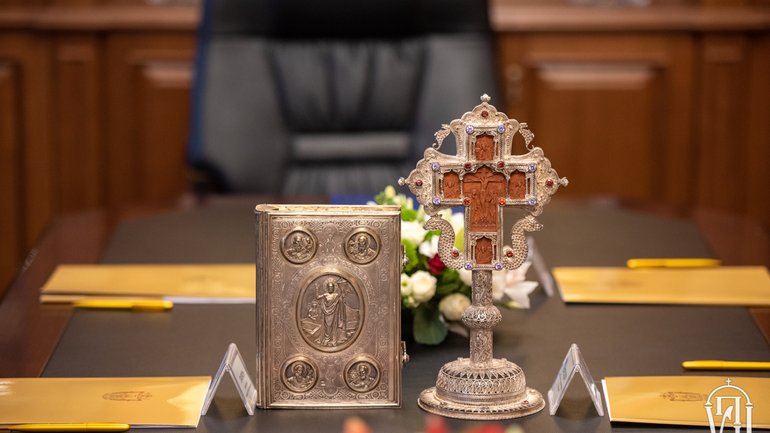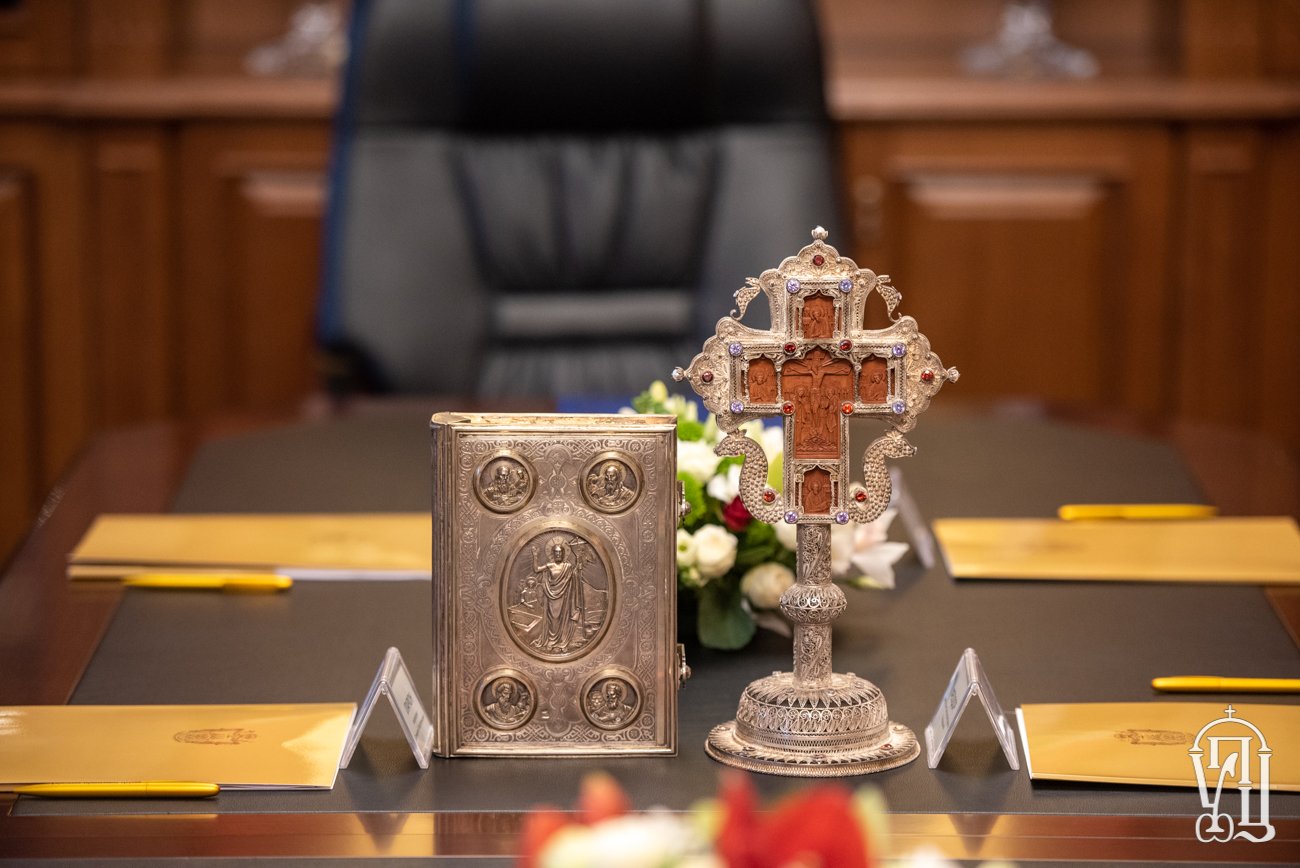UOC-MP also wants to convene a Pan-Orthodox meeting, - statement of the Synod


The Holy Synod of the UOC-MP, which took place in Kyiv on December 6, issued a statement on the latest developments in the sphere of inter-Orthodox relations.
The participants of the Synod note that due to the recognition of the Orthodox Church of Ukraine by the primates of the Orthodox Churches of Greece and Alexandria, the situation in world Orthodoxy has “significantly deteriorated”.
The UOC-MP believes that this crisis is not a problem of bilateral relations between Constantinople and Moscow and the Moscow Patriarchate, but concerns the entire world Orthodoxy — all the local Orthodox Churches.
Representatives of the Holy Synod of the UOC-MP, therefore, propose to bring this issue to the Pan-Orthodox Council discussion.
"Realizing all the difficulties associated with the convening of such a Pan-Orthodox meeting, we do not see any other way out of the crisis situation. Therefore, we welcome the initiative of His Beatitude Patriarch Theophilus III of the Holy City of Jerusalem and all Palestine to convene a Pan-Orthodox conference in Jordan," the hierarchs of the UOC-MP stated.
On November 21, 2019, in Moscow, Patriarch Theophilus III of Jerusalem expressed his readiness to make available to the Primates of the Orthodox Churches the residence of the Patriarchate in the Hashemite Kingdom of Jordan for a dialogue on preserving the unity of the Orthodox Church.
The OCU responded to the Moscow statement of the first Hierarch and explained that the Patriarch of Jerusalem does not have the authority to convene pan-Orthodox meetings, as it is within the competence of the Ecumenical Patriarch.
The statement of Patriarch Theophilus III was also commented on by the Greek Orthodox Church. Its head, Archbishop Hieronymos II of Athens and all Greece, in particular, said that he refused the offer of Patriarch Theophilus III of Jerusalem to participate in the meeting of Primates of Local Churches in the Jordanian capital Amman, which he announced during his visit to Moscow.
Below we bring to your notice the full text of the statement of the Synod of the UOC MP:
STATEMENT
of the Holy Synod of the Ukrainian Orthodox Church
of December 6, 2019
The Holy Synod of the Ukrainian Orthodox Church, having discussed the latest developments in the field of inter-Orthodox relations, declares:
1. We have to admit that due to anticanonical nature of the actions of the Patriarchate of Constantinople in Ukraine, and also due the admission into the communion of the schismatic "Orthodox Church of Ukraine" by the Primates of Alexandria and the Greek Orthodox Churches, the situation in the Orthodox world have deteriorated significantly and the separation between the local Orthodox Churches has deepened not only administrative but also on a spiritual level that is the level of communication in the Sacraments.
2. It became obvious that this crisis is not only a problem of bilateral relations between the Patriarchate of Constantinople and the Patriarchate of Moscow but concerns the entire world Orthodoxy — all the local Orthodox Churches since it destroys the very foundations of the life and mission of the Church of Christ. This problem is not administrative, but ecclesiological in nature. A new concept of the primacy of the Patriarch of Constantinople as "the first without equals" in world Orthodoxy, which the Orthodox Church has never known, and which is actually a violation of the principle of the Church's conciliarity and a consequence of a misunderstanding of the nature of the Church in General and the role of a separate Local Church in the Body of the Church of Christ in particular, has emerged. In addition, the Patriarchate of Constantinople began to allow persons who do not have the holy rank required to concelebrate, which is blasphemy and an outrage on the Eucharist.
3. Given this, the suspension by the Ukrainian Orthodox Church of the Eucharistic communion with the Patriarchate of Constantinople and with the Churches and hierarchs that recognized the schismatics is not an abuse of the Eucharist or even more so a blackmail by means of the Eucharist, as some people say, but on the contrary is the protection of the Eucharist and the preservation of the canonical and spiritual purity and integrity of the Church. For our Lord Jesus Christ, according to the Holy Apostle Paul, "s Christ loved the church and gave himself up for her, ... so that he might present the church to himself in splendor, without spot or wrinkle or any such thing, that she might be holy and without blemish" (Eph. 5:25-27).
4. It is for these reasons that the accusations against the Ukrainian Orthodox Church that it is moving towards self-isolation, stopping Eucharistic communion with those who have entered into communion with non-Orthodox schismatics, are false and manipulative. "In fact, we defend the purity of the canonical tradition of the Church, protect the Church from blasphemy. Otherwise, if persons who do not have legal ordinations are admitted to the priesthood, if the schism is declared by the Church, and the real Church of Christ is ignored or called a schism, then there is a danger of substitution of the Church. In addition, such anti-Church acts blur the line between the Church and schism. As a result, a new "Church" is created, founded by people, instead of the one that our Lord Jesus Christ founded, having acquired it for himself with his Blood (cf. Acts II. 20: 28).
5. One of the basic principles of the canonical law of the Orthodox Church is that he who enters into Eucharistic communion with the excommunicated persons becomes himself excommunicated from communion with the Church. In this regard, the admission by some local Churches into communion of persons who have committed a schism in other local Churches, who have not offered repentance for it and do not have a true holy rank, automatically raises the question before them as to whether the further presence in Eucharistic communion with schismatics is complicity in this sin and a violation of the above canonical principle?
6. We believe that the only way out of this crisis is a Pan-Orthodox conciliar discussion and solution of the whole complex of these problematic issues. "Realizing all the difficulties associated with the convening of such a Pan-Orthodox meeting, we do not see any other way out of the crisis situation. Therefore, we welcome the initiative of His Beatitude Theophilus III, Patriarch of the Holy City of Jerusalem and all Palestine, to convene a Pan-Orthodox conference in Jordan. In the difficult times of the history of our Church, there was already a case of the help of the Patriarchate of Jerusalem, when in 1620 Patriarch Theophanes of Jerusalem in Kyiv renewed the Orthodox hierarchy to replace those who left for the Union under the pressure of the then Polish-Lithuanian authorities. We commend, express gratitude and look forward to such calls for Pan-Orthodox conference from the Primates and hierarchs of other local Orthodox Churches, which have begun to sound more and more often in recent times.
7. We state that, unfortunately, geopolitical and political factors have begun to interfere in the life of universal Orthodoxy. As a result, individual Local Churches began to make ecclesiastical decisions under the influence of these factors, contrary to Church canons and the centuries-old tradition of the Church. We understand that each Local Church performs its Ministry within a particular state, and sometimes several or many states. Often this or that Orthodox people historically are very closely connected both with own state and with the Local Church. However, it is our deep conviction that every Local Church in its service to God should be above national, state or political boundaries and interests and not be subjected to external pressure, remembering that the Kingdom of God, which we preach, is not of this world (cf. John 18: 36). If each Local Church will associate itself exclusively with the interests of its own state, world Orthodoxy will not be able to be united, because it happens that States are in conflict or at war with each other, but the Church must maintain unity and reconcile people, and not become a party or a means of confrontation. We Express our hope that the Holy Orthodox Church, with God's help, will find the strength to overcome these challenges and preserve its unity, rising above national and state borders and interests, because in Christ there is "neither a Hellenist nor a Jew"... barbarian, Scythian ... but all and in all is Christ" (Col. 3: 11).
8. We appeal to the archpastors, pastors, monks and laity of our Ukrainian Orthodox Church. Dear lords, fathers, brothers and sisters! Not without the Providence of God, it so happened that it is in Ukraine and in our Church within the framework of world Orthodoxy that today the border between the Church and the schism lies. In this situation, we must preserve the purity of the canonical system and the teachings of the Church. They intimidate as by alleged self-isolation. But when we live in the true faith, there can be no self-isolation, as His Beatitude Metropolitan Volodymyr of Kyiv and all Ukraine said to the Holy memory: "there is no self-isolation with Christ." In fact, today our Ukrainian Orthodox Church, going through various trials, defends the unity of all world Orthodoxy. Don't be afraid! You are in the true Church! Love the Church, take care of the Church and yourself in It, because through it the Lord saves us. And leave everything else to the will of God. Remember that it is not the people who govern the Church, but the Lord himself. Let us pray that the Lord by his Holy Spirit will correct all human errors, cleanse us from all filth and save our souls!









